One of the films that has played to really strong audience reception on the festival circuit so far is Ben Lewin's The Sessions (opening November 8th). I enjoyed the film quite a lot myself and as I said in my review, it has the potential to go far in this awards season. For the ocassion of the film's premiere at TIFF, I interviewed William H. Macy who plays Father Brendan, an open-minded priest who consults Mark O'Brien (John Hawkes) about his sex life.
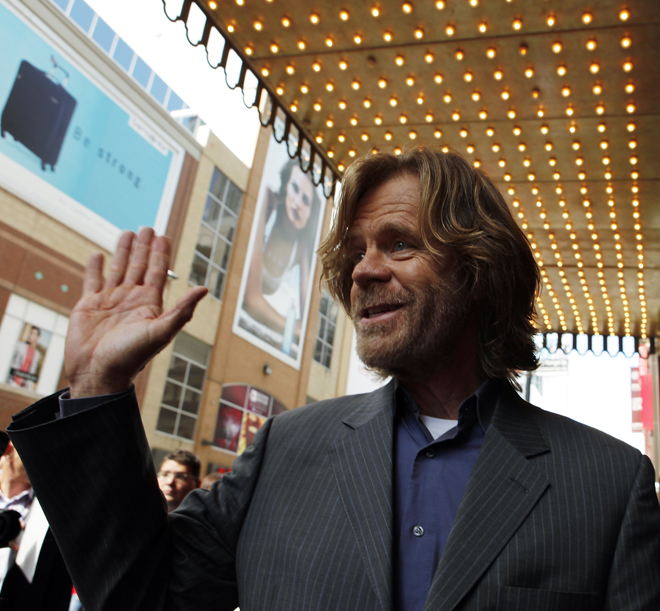 William H Macy at the Sessions premiere at TIFF © Kara Dillon [src]
William H Macy at the Sessions premiere at TIFF © Kara Dillon [src]
AMIR: I wanted to tell you a quick story. When I was a teenager I had a self-made poster of you pointing the gun to your face from your last frame in Boogie Nights. I guess it was my weird way of expressing my teenage angst. I’m understandably really nervous and excited to meet you in person.
WILLIAM H MACY: [Laughing] Interesting. I’ve had the same experiences as I go through my career, sitting in a room with these people that I’ve just idolized my whole life.
I can’t imagine you’re still fazed by it.
No, I meet some amazing actors. I really don’t know how to handle myself in those situations.
You’re newest film, The Sessions, it’s a really heartfelt and genuine film, but were you aware of Mark O’Brien prior to this? At what stage did you get involved in the project?
No. I wasn’t, and I think Helen and John were both set before I read the script. My agent sent me the script. Many years ago I did a film called Door to Door where I played a fellow with cerebral palsy and I got involved with a wonderful organization called United Cerebral Palsy. I think I was predisposed to like the script that way. I read it and I just thought it was a great tale. Well told, simple. It was the perfect timing for me. I’m doing a TV series and I was on hiatus. It was just a no-brainer. I tend to make decisions really quickly. If it’s good I just say yes right away.

AMIR: Did you have any reservations about playing this character? I don’t know how religious you are in your personal life, but playing religious figures is always tricky... [MORE AFTER THE JUMP]
...and especially one like Father Brendan, who is very unconventional. He’s not really bound by the book.
WILLIAM H. MACY: No, not at all. Personally, I’m not religious. My wife would say I mischaracterize myself as being anti-religious. I feel really angry about the extremes in religions and I think they’ve done great harm. But having said that...maybe it’s the actor in me that loves the underdog... in the States they talk a lot about the war on religion, especially from the far right of the Republican Party, and the impulse is to say that’s nonsense. But in fact, it’s true. I mean, often it’s well-deserved. All religions have blood on their hands by being taken over by a small radical faction. Having said that, you say priest now, and what does everybody think about? Molesting young boys. I wanted to portray the reality that there are 99 percent of priests out there doing very hard work for nothing. So I was really excited to play a priest who’s a good guy. We shot in a real church, by the way, which was really bizarre. But there’s a phrase going around “What would Jesus do?” I think this priest said, what would Jesus do, and he answered truthfully. I think he’s right. I think the Catholic Church will love this film and the priest that I portrayed. He made the right decision in my mind.
AMIR: I think if my religious teachers thought like Father Brendan I would think differently about religion, but I was never exposed to anyone like this in my environment.
WILLIAM H. MACY: I have run across priests who are really good guys and strangely, a lot of them are into theatre in New York. Very smart, intellectually curious people.
Of the three leads in the film, yours is the one who is fictitious. How did you approach building the character from scratch? Was it entirely your creation or did you get in touch with the priests that Mark O’Brien really knew?
I didn’t. I’ve always felt that if it is a good script, as an actor, everything I need is on the page. Conversely, if you have to do too much research to get yourself jazzed up to play it or to understand what’s going on in the script, probably, probably, it’s not a good script. In theory, the writer should give you everything you need. Of course, if you wanna play a doctor you have to learn how to use the machines, or if you wanna play a soccer player, you gotta learn the rules. The only thing I brought to this was a sense of levity. When I talked to Ben Lewin, I said the priest is kinda funny. It’s ironic the situation he’s in. I think all the humour we can bring to the film is good, especially for this character. He said that’s why I’m talking to you. And I think I always see the funny in a script, even though I’ve been in a lot of tragic, dark films. To that end, we tweaked a couple of scenes to make sure the joke was there. I took out my dad’s bible and made suggestions to Ben who rewrote a couple of sermons! The sermons could advance the plot this way, instead of being place holders.
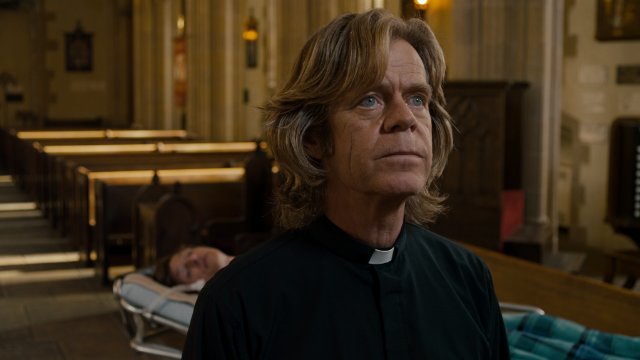
AMIR: You mentioned specifically that it was filmed in a real church. Did that have an effect on you, spiritually speaking, or just to get into the character? Like, would you have approached it any differently if it was on a set?
WILLIAM H. MACY: [Laughing] I wouldn’t have approached it differently, but because of the subject matter, the fact that he wanted to pay to have sex and that that conversation was taking place in a church, it felt odd. Those buildings come with their own prejudices. You automatically think you need to act differently. “You’re in God’s house.” You have to watch your language. It was lovely. When John said “So father, should I do this?” and directed me to walk to the altar and look up to this magnificent rendering of Jesus Christ and say
I think he’d give you a pass. I think he'd give you a pass."
I say go for it. And to “give you a pass”, those words are so well chosen. It’s weird to look up to that Jesus, who of course is a white guy with blond hair and blue eyes, and bring up that subject matter. Really odd. It didn’t form the film, but to a certain extent I felt proprietary about the church. It was easy to say this is my workplace and it made John a guest in my house.
I’ve always thought that with your characters, even if they’re not particularly likeable like, say, Lundegaard (Fargo) or Frank Gallagher (Shameless), there’s an innate sweetness in them that allows the audience to sympathize with them. In Father Brendan, that sweetness is really at the forefront. Is it easier for you to play a character like this who’s presumably closer to yourself or is easier to challenge yourself with something that’s really far off?
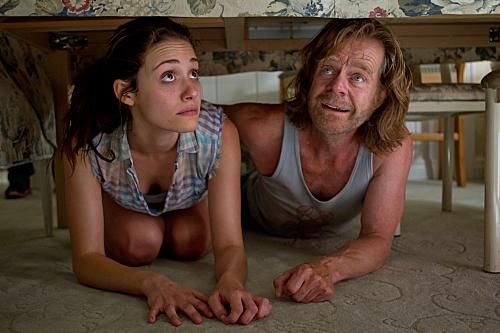 Emmy Rossum and William H. Macy in Showtime's "Shameless"
Emmy Rossum and William H. Macy in Showtime's "Shameless"
WILLIAM H MACY: Interesting. The whole notion of taking what should be an unlikeable character and making the audience, despite their best intentions, like that character; I don’t know how I do that. I’m sorely tested in Shameless. One reason that it works is that it’s very seductive to see someone who’s striving. It doesn’t matter what they’re striving for. It can be a bank robber or a murderer, but when you see someone with obstacles thrown in his way and still striving, it’s hard not to root for the guy, regardless. I think I also have a pretty wicked sense of humour. I love to laugh and make jokes so perhaps that’s ever present in whatever I do. And then I guess it’s a function of casting. People cast me to do what I do.
True. For me personally, you were in two of the films that are definitive in forming my passion for film: Fargo and Boogie Nights. It’s probably the same with many others in my generation so the image I had of you through those films was entirely different from your family man image in the media. That’s not the case with the character you play in The Sessions. Is that a consideration when you choose roles? I know a lot of actors have reservations about playing characters that don’t go along with their public image.
To be candid, I don’t have luxury. I have a lovely career and I’ve been really lucky but I don’t get offered enough roles to shape my persona.
That’s a shame
Well, every once in a while, I’ll have an embarrassment of riches and I’ll be offered three roles and I’ll have to choose. My criteria has always been “what’s the best film?” I would much rather be in a successful film than to have a leading role in an unsuccessful film. I’ve taken lesser roles in better films. I think it’s an actor’s job to bring as much of your personality as you can to every role. Some people find that shocking. They view the actor’s job to sublimate your own personality into the character. I don’t look at it that way. I think once you take the role, you are the character. That’s it. If they dress me up in fine clothes and put a crown on my head and call me the king, I’m the king. I don’t have to act like the king, I AM the king. So I try to find in each role, the similarities to my existence, not the differences. And one more thing about is that there is a great joy in taking something that’s far afield from your experiences or perhaps even your beliefs. There’s great fun in playing the bad guy. I’ve always secretly wanted to, well, not so secretly, but I’ve thought that a racist, a real dyed-in-the-wool bigoted racist who hates black people or Indians or women or whatever...
That would be fun to play?
Extremely! Because many times the writers and directors and the actors want to put quotes around what they do, so they make sure that everyone knows “I’m personally not a racist, I’m just playing racist.” That kills it. Racists in Southern movies are mostly cartoons. They’re caricatures. And I think that robs us of the real story. The people who fought integration in the United States had a point of view.
They never had that asterisk.
They didn’t. They thought they were protecting God’s word or whatever. I like to play those roles sometimes. And if it’s played that way, it’s so much more devastating and frightening than if there are quotes around it.
I also wanted to ask you about your relationship with John [Hawkes] behind the scenes because you have a really interesting dynamic on screen. He obviously looks up to you and cares about what you think, but it’s also a little bit confrontational in the sense that there’s an ideological back and forth between you two. How did that relationship come to happen behind the scenes? I saw John outside just now and I couldn’t bring myself to say hi, because despite his character in this film, I still can’t shake off how menacing he was in Winter’s Bone and Martha Marcy.
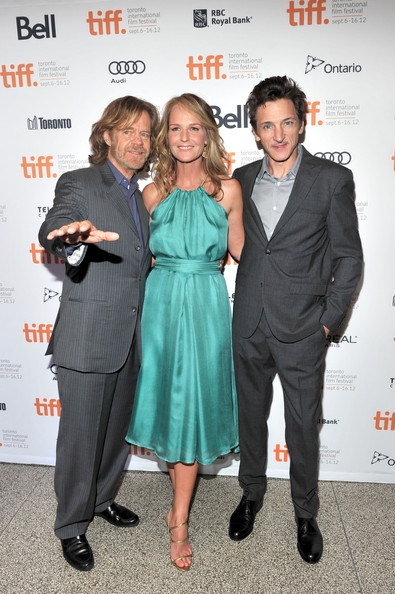 The stars of "The Sessions" at the TIFF premiereOH MY GOD! He scared the sh*t out of me. [Laughing] No, he’s really a sweet guy. This is much closer to him than Winter’s Bone. I only knew him through his work so when we met I was just his fan. There’s a fraternity of actors. Felicity [Huffman] says it really well: “He’s in the tribe.” John’s definitely in the tribe. So when I first met him, we just embraced. “Hi, this is John Hawkes” and we hugged each other. I love his work so much. Our off camera relationship was not unlike the relationship you see on camera. We traded barbs, we gossiped about other actors we know and we made jokes. We made fun of ourselves. It was intellectual and humorous, not unlike what we did for the camera.
The stars of "The Sessions" at the TIFF premiereOH MY GOD! He scared the sh*t out of me. [Laughing] No, he’s really a sweet guy. This is much closer to him than Winter’s Bone. I only knew him through his work so when we met I was just his fan. There’s a fraternity of actors. Felicity [Huffman] says it really well: “He’s in the tribe.” John’s definitely in the tribe. So when I first met him, we just embraced. “Hi, this is John Hawkes” and we hugged each other. I love his work so much. Our off camera relationship was not unlike the relationship you see on camera. We traded barbs, we gossiped about other actors we know and we made jokes. We made fun of ourselves. It was intellectual and humorous, not unlike what we did for the camera.
He’s a good guy, a really interesting guy.
I’m really hoping you get another Oscar nomination for this. It’s about time.
Wouldn’t that be sweet? What a bizarre world that would be.
I know there’s a lot of campaigning but I hope you make that effort.
I’m only in it about how many minutes? It’s a simple role, but I’ve found this a couple of times, when you most doubt it, when it’s so easy, when you do a scene and think “that can’t be it. All I did was talk to the guy.” Many times that’s the hallmark of good acting. It seems simple. When it’s fraught and when you’re working really hard at it, that’s many times a harbinger of failure.
It always shows on the screen when an actor is trying too hard.
Yeah, doesn’t it? A lot of actors think they have to suffer to be good and that’s just not true. You don’t have to suffer. No one cares.
It is such a pleasure meeting you in person.
For me too. I loved your story. I will repeat it that you had a picture of little Bill. Wasn’t Boogie Nights just swell?
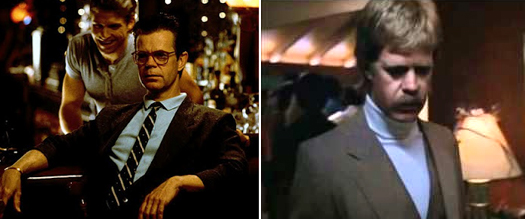 William H Macy in P.T. Anderson's Magnolia (1999) and Boogie Nights (1997)
William H Macy in P.T. Anderson's Magnolia (1999) and Boogie Nights (1997)
AMIR: It’s one of my favourite films. Well, all of Anderson’s work is.
WILLIAM H MACY: I can’t wait to see The Master. And speaking of religion, that’s one to watch. You just don’t mess with scientology.
I think you should work with him again. Both of your films together were amazing.
Don’t tell me. Tell him!

Do you have a favorite William H. Macy performance? How do you feel about "free passes"?
Previous interviews